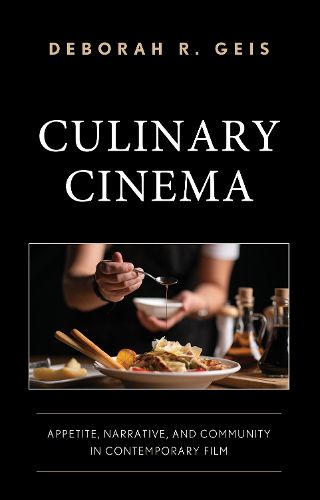Readings Newsletter
Become a Readings Member to make your shopping experience even easier.
Sign in or sign up for free!
You’re not far away from qualifying for FREE standard shipping within Australia
You’ve qualified for FREE standard shipping within Australia
The cart is loading…






In this book, Deborah Geis offers a new approach to the evolving genre of culinary films that center on the acts of eating and cooking through close analyses of ten different films. These films range from the classics, like Big Night (1996) and Babette's Feast (1987) to later box-office hits, like Chef (2014) and to films that deserve a second look, like East Side Sushi (2014), Burnt (2015), and Mid-August Lunch (2008). Throughout these analyses, the book focuses on tropes including the "big dinner" as it connects to intercultural and transcultural communities; the self-destructive perfectionism of the obsessive chef; and the craft of cooking in relation to aging and mortality. Geis invites readers and viewers to experience food-driven narrative films with an appetite for appreciating the visual ingredients and the ways in which they construct pleasure through the act of looking as a vicarious approach to consuming the actual food. Drawing on the work of film theorist Christian Metz, Geis ultimately poses a new paradigm for watching and understanding culinary cinema as a significant - and constantly-evolving - genre that comes with its own conventions and contemporary filmmakers who seek to expand and transform those conventions in surprising ways.
$9.00 standard shipping within Australia
FREE standard shipping within Australia for orders over $100.00
Express & International shipping calculated at checkout
In this book, Deborah Geis offers a new approach to the evolving genre of culinary films that center on the acts of eating and cooking through close analyses of ten different films. These films range from the classics, like Big Night (1996) and Babette's Feast (1987) to later box-office hits, like Chef (2014) and to films that deserve a second look, like East Side Sushi (2014), Burnt (2015), and Mid-August Lunch (2008). Throughout these analyses, the book focuses on tropes including the "big dinner" as it connects to intercultural and transcultural communities; the self-destructive perfectionism of the obsessive chef; and the craft of cooking in relation to aging and mortality. Geis invites readers and viewers to experience food-driven narrative films with an appetite for appreciating the visual ingredients and the ways in which they construct pleasure through the act of looking as a vicarious approach to consuming the actual food. Drawing on the work of film theorist Christian Metz, Geis ultimately poses a new paradigm for watching and understanding culinary cinema as a significant - and constantly-evolving - genre that comes with its own conventions and contemporary filmmakers who seek to expand and transform those conventions in surprising ways.